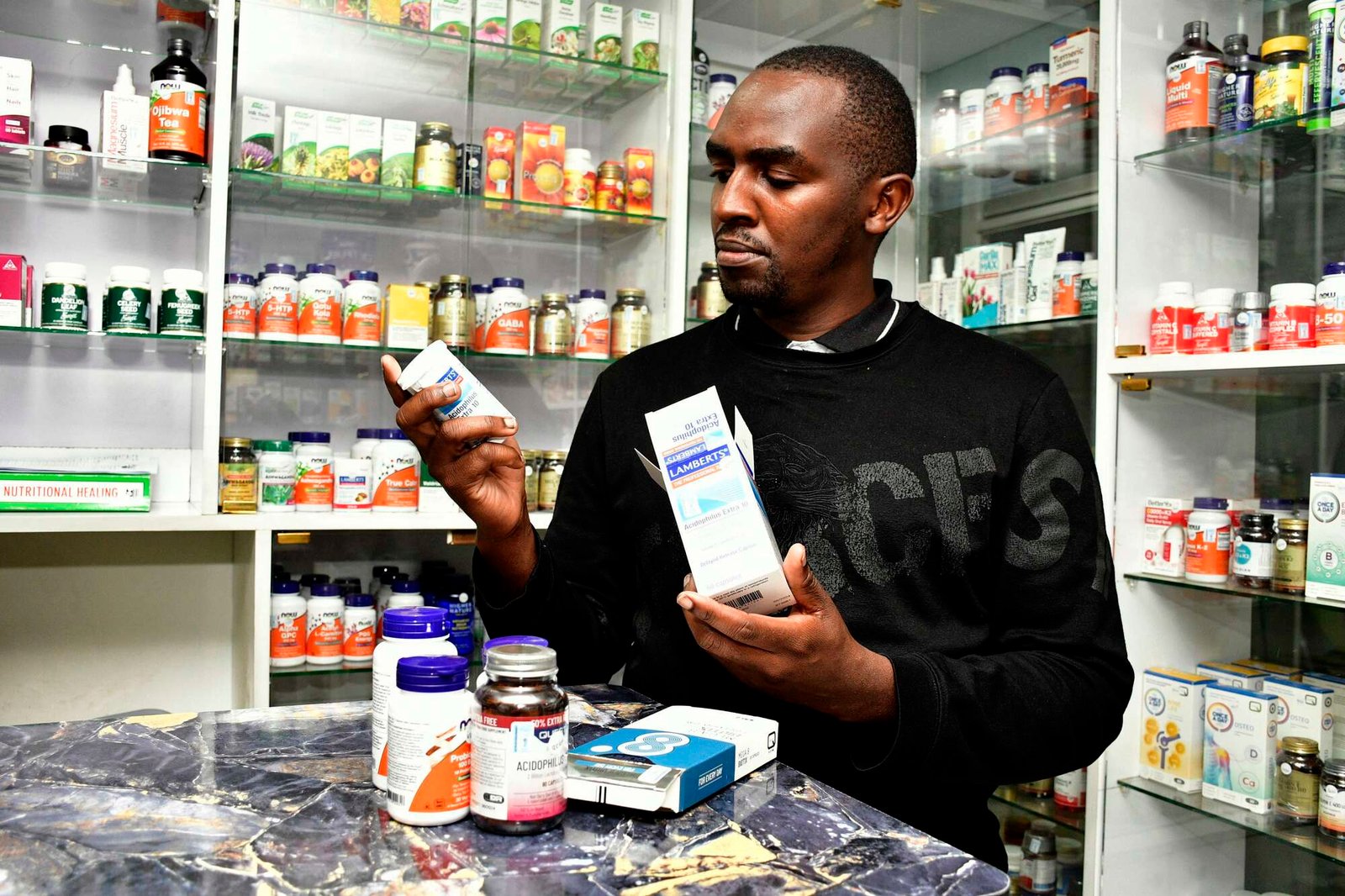[ad_1]
Wellness & Fitness
Probiotics: Elixir or placebo hype?
Thursday April 27 2023
Health Cart Limited Nutritionist Musembi Muthusi shows some of the Probiotics on sale at the shop located at HH Towers on April 26, 2023. PHOTO | FRANCIS NDERITU | NMG
Probiotics are everywhere. Walk along any street or alley in Nairobi and you will find medicines that are believed to contain healthy bacteria that help heal the stomach.
But do these probiotics-containing products provide the health benefits they claim? Some experts argue that they are unnecessary, others say you need them.
Over the past years, they have become popular among the health-conscious, with thousands of Kenyans now using them.
Musembi Muthusi, a clinical nutritionist at Health Cart, says people should give their gut a helping hand by safely introducing daily probiotics as part of their routine to improve gut health. It is said that all diseases begin in the gut.
“Every time we eat or drink or expose ourselves to chemicals and hormones, we are either feeding disease or fighting it,” he says.
The nutritionist says people can take probiotics to help reduce symptoms of certain medical conditions, bolster their immune health, and even ease depressive symptoms.
“Trillions of tiny microbes which include bacteria, viruses, and fungi form part of the ecosystem, most of which reside in the gastrointestinal tract. The key to good health is to maintain an optimal balance of microbes in our system,” he says, adding, “Probiotics are living organisms that restore the beneficial (friendly) bacteria in the intestine and help maintain the gut’s bacteria balance.”
The friendly bacteria in the intestine are responsible for digestion and regular bowel movements, absorption of nutrients into the bloodstream, and protection from infection and inflammation.
They also play a crucial role in the regulation of metabolism and preventing or controlling type 2 diabetes, and strengthening the immune system – over 60 percent of your immune system is located within your gut.
Demand has risen for supplements that range from between Sh2,000 to Sh,8000.
Mr Muthusi sells up to six bottles of the supplements in a day, which he says is “a good sale.”
Some of the probiotics on sale at the Health Cart Limited shop located at HH Towers on April 26, 2023. PHOTO | FRANCIS NDERITU | NMG
Mary Ndung’u, who runs a chemist in Nairobi’s Central Business District has been selling probiotics alongside other supplements for 12 years, says the uptake is gradually picking up because some are medically prescribed.
But the high demand has also created a thriving black market, selling counterfeits.
Mr Muthusi says their main fear is finding supplements on the streets which have been tampered with.
Dr Sayed Karar, the associate professor and consultant internal medicine specialist at Aga Khan University Hospital Nairobi says beware of the probiotics hype.
In healthy people, he says, probiotic supplements offer little benefit. But for most people, more reliable ways are available to nourish your gut microbiome.
“People should be on the lookout as there is no convincing evidence that probiotic supplements work,” says Dr Sayed.
Dr Sayed Karar, a consultant palliative physician at Aga Khan University Hospital. FILE PHOTO | COURTESY
“The common ones in the market are enterogermina which contains Bacillus Clausii that helps maintain and restore the intestinal bacterial flora, and flora norm which contains Saccharomyces boulardii which is a type of fungus,” he adds.
Probiotic supplements come in the form of capsules, gummies, powders, and pills that contain live microorganisms believed to boost gut health.
Dr Sayed says people with gastrointestinal ailments are believed to benefit from these supplements; they are prescribed for various conditions including infectious diarrhoea, abdominal pain, constipation, and inflammatory bowel diseases like ulcerative colitis.
He says that there is no definite time that one needs the supplements, “no strong evidence that they help, so long as it’s not doing any harm, it’s okay to use them.”
Also, there is no harm in giving them to children.
Yoghurt and cheese
Fermented foods are alternatives to eating probiotics.
Dr Sayed advises that one should instead eat and drink foods like yoghurt and cheese.
“One of the benefits of fermented foods is that they typically contain not just probiotics (the live microbes) but also prebiotics (the fibre the microbes eat) and postbiotics (the vitamins and other nutrients they produce),” he says.
This supports a study published in the journal Cell, where Stanford University researchers found that assigning people to eat fermented foods every day over 10 weeks lowered their levels of inflammation and increased their gut microbiome diversity.
Some of the probiotics on sale at the Health Cart Limited shop located at HH Towers on April 26, 2023. PHOTO | FRANCIS NDERITU | NMG
Dr Sayed advises that to keep healthy, one should eat a variety of vegetables, nuts, seeds, beans, and whole grains, which provide gut microbes with the fibre-rich fuel that they need to thrive.
“These microbes thrive on the fibre found in fruits and vegetables, turning it into new compounds or “postbiotics,” including butyrate, acetate, and other short-chain fatty acids that appear to be exceptionally good for your health,” he says, adding, “Always refer to your physician or expert consultation to guide you on what to take and what to avoid.”
[ad_2]
Source link



